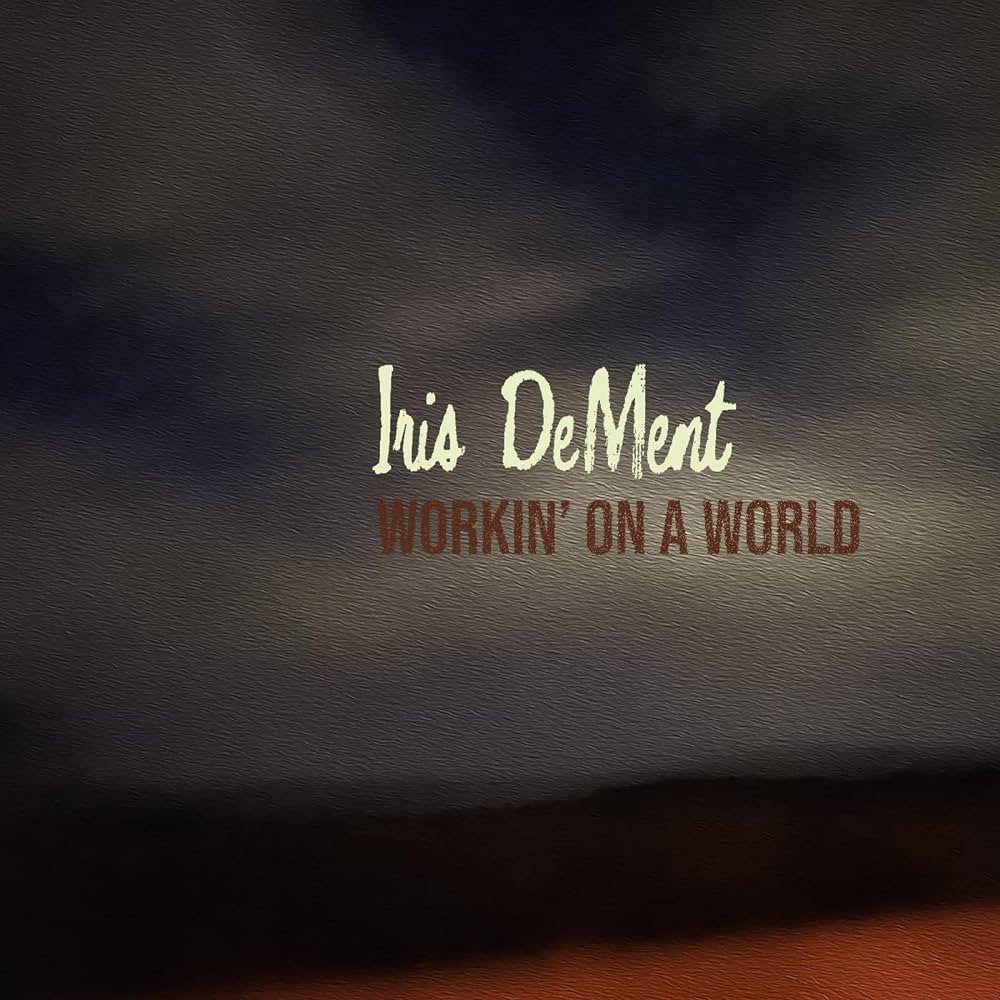…Tolstoi said
the purpose of poetry is to provoke
feeling in the reader, to ‘infect’ the reader,
he said, — and so to induce a change,
a change of conscience
that may lead to a change in the world, that will
lead to a change in the world!
How can poetry be written by people who want no change?
– From “California” by Hayden Carruth
Iris DeMent isn’t afraid of getting her hands dirty. Beginning with her 1992 debut Infamous Angel, the 62-year-old singer-songwriter has given listeners a jukebox-worth of songs that plumbs— yet never dilutes—the mysteries of familial, romantic, and spiritual love. Yet when compelled, she’s also responded to political and cultural upheaval.
The sobering The Way I Should— including “There’s A Wall In Washington”, a haunting response to the Vietnam Veterans Memorial, and “Wasteland Of The Free,” a sprawling, angry litany of America’s hypocrisies and inequities– left some in the roots music community wishing DeMent would leave matters of the state to the politicians and pundits.
On subsequent albums like Lifeline— a collection of traditional gospel songs– and The Trackless Woods—her musical interpretations of poems by Russian poet Anna Akhmatova– she turned her gaze elsewhere, but in 2017, she penned “We Won’t Keep Quiet”, a resistance anthem for the Women’s March and a prelude to her latest full-length, Workin’ On A World, which arrived in February.
With Workin’ On A World, DeMent has returned with a 21st Century protest record, a candid response to Trump-era politics, racism, police brutality, the threat of Christian nationalism, and our country’s bloodlust for firearms. Yet she is ambivalent about the protest music tag. She says, “There’s plenty of music that came into my world that I guess you could have called ‘protest’ music, but I didn’t think about it as such. It felt like the same thing I’m doing when I’m talking about what I love and care about, what matters to me, so I never have differentiated. When I was a kid hearing stuff, I don’t remember ever having a consciousness where I separated that out and put it over in some lonely little box over the corner. It’s just people singing their soul and throwing lifelines out. That’s how I think of songs, whether there’s songs about people in your circle that you love or songs about the bigger world. I feel like that’s what I’m trying to do: throw lifelines out there to other folks. That’s kind of how I measure the quality or the value of the songs, to tell you the truth– is it gonna keep somebody afloat?
“Sometimes keeping somebody afloat means challenging their theories and their ideas. I was an evangelical fundamentalist kid ’til I was like seventeen. I spent more time praying than studying my schoolwork. I believed Jesus was gonna burst through the clouds of glory, and I couldn’t quite make sense how it could be that everybody around the world could see him et cetera, et cetera. But I believed all that. I was very devoted to what– I will just be straight with you and say I realize– is a lot of untruths. But somebody challenged me, or I was open to being challenged. And I feel like I’ve gotten to a more solid, whole place as a result of that.”

For DeMent, there’s little difference between the more intimate songs from Infamous Angel and Sing the Delta and this collection.
“I never have [seen the difference between the personal and the political],” she says. “When I put out The Way I Should and “Wall In Washington” and “Wasteland Of The Free,” it didn’t seem any different to me than when I’m writing a song talking about my mother or people I love. I’m talking about people in the country that I love. That’s how I saw it when I wrote ‘Wasteland Of The Free’ or ‘There’s a Wall in Washington.’ I understand the difference, and yet I kind of don’t because for me it comes from the same place—I’m this human being affected by all these things, and I have feelings and thoughts that I feel I need to express. When I’m singing about John Lewis, my heart swells the way it would swell if I was singing about a dear loved one. It doesn’t feel different to me.”
“Goin’ Down To Texas”, the collection’s first single, is the album’s centerpiece, a nearly 9-minute Walt Whitman-esque catalog of injustices DeMent was inspired to write after playing a show in a firearm-friendly Austin venue. In the first verse, she denounces the state’s lax gun laws, but those initial lines are a launching pad for subsequent stanzas devoted to the impossibly-redeemed George W. Bush, Jeff Bezos, and critics of The Chicks and The Squad. The track rambles along with the best of Woody Guthrie’s talking blues songs.
“I actually deleted two verses that were in the original version,” DeMents says. “Every time I sing it, I think, “Well, there’s three or four other topics now that I could bring in here. I think that overall, it’s clear what my umbrella is. Folks can imagine what else might be under there without me telling them. Those were the key things I felt like I had to touch on, and some of it was just my need to announce solidarity. My body, my soul needed to speak to some of these people– Colin Kaepernick and AOC and the Muslims in my community who were being threatened in the streets of my little town. That song came from a lot of things, but part of it was just my basic human need to say, ‘Hey, I’m here with you, and you’re not alone.’”
This push for solidarity provides a throughline that leaves Workin’ on a World feeling more deliverance than doomsday. “Warriors Of Love”, “Mahalia”, and “How Long” find strength in embracing fellowship while acknowledging the worth of the individual. In the title track, she recognizes a sense of responsibility that comes with maturity, the realization that we won’t live to see our best efforts– activism, conservation, patience, grace– come to fruition. Progress is indeed a long game that runs antithetical to the instant gratification we’ve become accustomed to. Could she have written that song a few decades ago?
“Well, I didn’t write it then,” DeMent says, “so obviously that wasn’t my main push back then. I think it’s the combination of my age and what’s going on in the world, which is even worse than what was going on when I wrote that song in 2016. I’m 62, and I have kids. I have grandkids. I have great-grandkids now. My perspective is quite different, looking at this totalitarian movement and this disturbing Christian nationalism that’s wreaking a lot of havoc here. Again, it’s a weird thing for me because I was inside of that, and I understand it. I was like all the way inside of it. But I didn’t know to be afraid of it then, and now I do know. There’s just so much worth fighting for. I’m despairing like everyone else, but I feel privileged to be here and be in a time in history where I can. I still have my health, and I can work towards something better.”
DeMent will spend the next few months touring in support of the record, understanding that she might encounter less than receptive, possibly even hostile audiences, but she remains undeterred.
“I’m older and I feel stronger, and I feel more solid in what my mission and my purpose are. I feel at peace with that, and I feel privileged, I really do. If both of my knees shake so that I fall down, that’s fine. I still feel privileged to be able to be out there and to be able to spread something that I think is hopeful and good. That’s fine with me.
“But when I was younger, there were times, yeah, it was very, very difficult to do. I took a little time off. It rattled my brain, and it took me aback. When The Way I Should came out, I was just not aware of the wave of violence. When I say violence, I mean, people that actually wanna harm other folks for their thoughts and opinions. I was a little naïve, but that’s over now.
“Love is really powerful, and I’m always checking with that: Am I doing this out of some ego thing or out of love? And if the love answer comes up, I forge on ahead, and I think that’s what we all have to do. That should be our goal to check in with ourselves and see where we’re coming from and if it’s a righteous place, do whatever it takes and go.”
Workin’ On A World is available now on all your favorite digital platforms or directly from the artist.
Charlie Farmer is a Georgia writer and professor who loves his wife, his daughters, his students, his cats, his books, his LPs, and everything else one should love in life.
